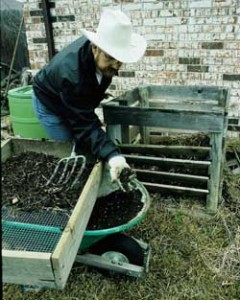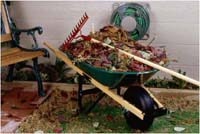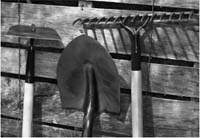Home & Backyard Composting
go.ncsu.edu/readext?425129
en Español / em Português
El inglés es el idioma de control de esta página. En la medida en que haya algún conflicto entre la traducción al inglés y la traducción, el inglés prevalece.
Al hacer clic en el enlace de traducción se activa un servicio de traducción gratuito para convertir la página al español. Al igual que con cualquier traducción por Internet, la conversión no es sensible al contexto y puede que no traduzca el texto en su significado original. NC State Extension no garantiza la exactitud del texto traducido. Por favor, tenga en cuenta que algunas aplicaciones y/o servicios pueden no funcionar como se espera cuando se traducen.
Português
Inglês é o idioma de controle desta página. Na medida que haja algum conflito entre o texto original em Inglês e a tradução, o Inglês prevalece.
Ao clicar no link de tradução, um serviço gratuito de tradução será ativado para converter a página para o Português. Como em qualquer tradução pela internet, a conversão não é sensivel ao contexto e pode não ocorrer a tradução para o significado orginal. O serviço de Extensão da Carolina do Norte (NC State Extension) não garante a exatidão do texto traduzido. Por favor, observe que algumas funções ou serviços podem não funcionar como esperado após a tradução.
English
English is the controlling language of this page. To the extent there is any conflict between the English text and the translation, English controls.
Clicking on the translation link activates a free translation service to convert the page to Spanish. As with any Internet translation, the conversion is not context-sensitive and may not translate the text to its original meaning. NC State Extension does not guarantee the accuracy of the translated text. Please note that some applications and/or services may not function as expected when translated.
Collapse ▲Introduction to Home Composting

A homeowner sifts soil made from his compost bin in background. Composting is an excellent way to recycle organic household and yard materials.
More than 25% of the typical household’s waste is yard trimmings and food scraps that can be composted.
- Homegrown Video: Tips for backyard composting
- Homegrown: How to Set Up a Worm Bin
- Video: Introduction to Composting
Composting is the controlled decomposition of organic materials into a soil-like substance called compost. Organic materials, such as grass clippings, leaves, yard trimmings, food scraps, and non-recyclable paper products, can be composted at home in compost bins, piles, or worm bins. Home composting is an easy and economical way for individuals to convert their organic waste into a soil amendment that they can use to mulch landscaping, enhance plant growth, enrich topsoils, and provide other benefits to plants and soil.
Compost benefits include:
- improves soil health & fertility
- increases the nutrient content of soils
- promotes higher yields of crops
- brings & feeds diverse life in soils
- makes soil easier to work with
- increases soil porosity & moisture retention
- suppresses plant diseases & pests
- can reduce the need for fertilizers & pesticides
- encourages healthy root systems
- helps regenerate poor soils
- can prevent & manage soil erosion problems
- reduces water demands of plants & trees
4 Great Reasons to Compost Yard Waste
It saves money – Converting your food scraps and yard trimmings to compost saves on buying soil amendments and fertilizers. Homeowners who discard yard waste are giving away their yards’ potential soil nutrients
Saves time – Discarding to a compost pile is often faster than bagging and bundling sticks for streetside yard disposal.
Reduces trash disposal – Your community will need less landfill space and incinerator capacity. Less pollution will be emitted by landfills and waste-hauling trucks
It’s educational – Learning about composting and natural processes is interesting for people young or old. Children can learn to conserve natural resources through composting activities. It’s a great way to teach natural sciences.
Simple tools to get you started…
 You can compost in a pile or in a bin that you have constructed or purchased. On the internet, you can find plans for making compost bins or sites that sell manufactured bins. Some communities sell composting bins at a subsidized rate. Place your compost bin in a flat, open space that is easily accessible but not right next to your house. Keep areas in front of and above the bin clear so you can get to it easily. Placing it in a shady area is best so it won’t dry out as quickly. Siting your bin near gardens where you will use the compost is also a good idea.
You can compost in a pile or in a bin that you have constructed or purchased. On the internet, you can find plans for making compost bins or sites that sell manufactured bins. Some communities sell composting bins at a subsidized rate. Place your compost bin in a flat, open space that is easily accessible but not right next to your house. Keep areas in front of and above the bin clear so you can get to it easily. Placing it in a shady area is best so it won’t dry out as quickly. Siting your bin near gardens where you will use the compost is also a good idea.
Composting tools list (suggested, not necessary)

- Thick work or gardening gloves
- Digging fork with metal tines and reinforced handle
- Aerator (resembles screw or butterfly clips)
- Watering can or hose
- Containers or buckets
- Screener
- Flat shovel or tapered spade
Questions and Answers
How do I compost?
Two basic styles: Single Batch (materials are added only once to form a pile) and Continuous Pile (add materials as they become available).
When is compost ready to use?
It takes about 3 to 6 months to produce finished compost using the Hot Pile Method. The Cold Pile Method will take about a year or longer. Compost is ready to use when it is dark brown, has a light and crumbly texture similar to potting soil, and has a pleasant, earthy scent.
Are animals attracted to compost piles?
Not if you manage the pile correctly. Don’t put meat, fish, dairy products, grease, oil, bloodmeal or bones in your compost bin. Cover kitchen scraps or vegetable garden trimmings with brown leaves or other carbon materials.
Horticulture Extension Publications on Home Composting
- Backyard Composting of Yard, Garden, and Food Discards Sherman, R. 2017. NC State Extension. AG-791. 5 p.
- 2-page handout version (print on both sides of one sheet of paper)
- Composting (Sherman, R. 2017. Composting, Chapter 2. In: K.A. Moore, and. L.K. Bradley (eds). Extension Gardener Handbook. NC State Extension, Raleigh, NC. 14 p.
- What CAN be Composted (Rhonda Sherman)
- Herbicide Carryover in Hay, Manure, Compost and Grass Clippings: Caution to Hay Producers, Livestock Owners, Farmers, and Home Gardeners Davis, J., Johnson, S.E., and Jennings, K. 2020. AG-727W. NC State Extension. 6 p.
- Making the Most of Your Garden’s Soil. Ashley Troth. April 16, 2020. Durham County Cooperative Extension.
- Community Backyard Composting Programs Can Reduce Waste & Save Money Sherman, R. 2020. NC State Extension. AG-599. 12 p.
- Composting and Microorganisms (Rhonda Sherman)
- Compost Pile Troubleshooting (Rhonda Sherman)
- Composting at NC Residential and Summer Camps Sherman, R. and Caldwell, E. 2018. NC State Extension. AG-773. 4 p.
- Composting in Childcare Center Gardens Sherman, R. 2020. NC State Extension. LF-007-07. 4 p.
Other Web Sites and Publications
- NCDEQ Division of Environmental Assistance
- NC Composting Council
- Building Your Own Composting Bin: Designs for Your Community (California Integrated Waste Management Board, Pub. No. 442-95-054, Rev. 6/06, 27 p.).
- Composting and Mulching: A Guide to Managing Organic Yard Wastes
- Home Composting
- Composting and Mulching
- Cornell Composting for Schools


